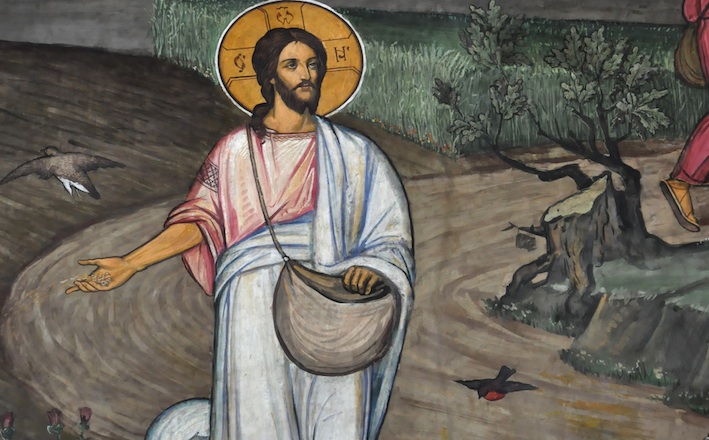Commentary on Matthew 13:1-9, 18-23
Since chapter 4:17, Matthew’s Jesus has manifested the empire of God as the agent of God’s saving presence (1:21-23).
Some have received Jesus’ ministry through his proclamation, teaching, healings, and exorcisms, experiencing the merciful transformation of God’s intervention. But while some join with him in doing “the will of my Father in heaven” (12:50), others, such as the unrepentant cities, societal leaders, scribes, and Pharisees (11:16-24; 12:1-42), reject Jesus’ ministry.
Matthew 13, comprising seven parables, stops the forward movement of the Gospel story to reflect on this emerging division. The parables catalogue diverse responses, offer some explanations for them, affirm the readers’ positive responses, and illustrate how God’s empire is at work in the world. They also challenge the audience afresh to continue to live on the basis of God’s empire in the midst of various difficulties until its full purposes are accomplished.
Beginning in 13:3, the word “parable” occurs twelve times in the chapter. The word derives from a Greek word meaning “to throw alongside.” That is, basic to the parable genre is the notion of comparison; one entity is set alongside something else to be illuminated by the comparison. Thus “the empire of the heavens” is “thrown alongside” or compared to and illuminated by the situations that each parable depicts (13:24, 31, 33, 44-45, 47).
The first parable takes place “beside the sea” of Galilee where Jesus called the first disciples (4:18-22). Jesus addresses the crowds with a parable (13:2), then offers the disciples an interpretation in 13:18-23. This first parable is unusual in that it does not begin, as most of the other parables will, with an explicit comparison introduced in an opening formula: “The empire of heaven may be compared to … ” Rather the parable immediately narrates its situation.
The parable presents a scenario involving a male peasant farmer. This scenario was familiar to the gospel’s largely rural audience who knew well the ways of its agriculturally-based society. The sower sows seeds which fall into four different types of ground with quite different consequences.
In verse 4, seed that falls on a path is eaten by birds. In verses 5-6, seed that falls among rocks sprouts quickly but, lacking depth of soil, dries up in the sun. In verse 7, seed that falls among the thorns is choked by them. But in verse 8, seed that falls into good soil produces an abundant crop.
The parable ends with an appeal — “let anyone with ears, listen” (13:9). To have ears is an image that points beyond literal hearing to discerning the significance of Jesus’ words. Jesus, though, offers no help to his audience to understand the significance of the scene he has presented.
The disciples, though, ask Jesus confidentially about why he speaks in parables (13:10). After offering an explanation that emphasizes the divisive effect of the parables (13:11-17), he sets about explaining “the parable of the sower” (13:18). Interestingly, while he refers to the parable as “the parable of the sower,” the explanation does not focus on the sower. It does not even identify the sower explicitly.
Yet in identifying the seed as “the word of the kingdom” (13:18), Jesus offers a clear hint that the sower is himself. The phrase “word of the kingdom” resembles the description of Jesus’s work as “proclaiming the good news of the kingdom” (4:23; 9:35).
Jesus’ explanation, instead, focuses on the fate of the seed in different types of ground. These scenarios represent various responses to Jesus’ ministry. The seed that falls on the path represents those who hear but do not understand Jesus’ proclamation (13:19). That is, they do not discern in Jesus’ words and actions the presence of God’s empire (4:17) or saving presence.
But Jesus goes on to say that this non-understanding does not only reflect their dull hearts (13:15). It is simultaneously the work of the devil, the evil one (6:13), who resists God’s purposes by “snatching away” Jesus’ word from the human heart. The heart is the center of a person’s willing, thinking, knowing, deciding and doing, the center of their commitments and way of life.
The parable does not pause to explain why the devil seems to be more powerful in influencing the human heart than God’s word.
The seed that falls on the rocky ground sprouts quickly but dies in the sun, exemplifies the person who readily receives Jesus’ preaching about the kingdom but does not endure as a disciple (13:21). In this scenario, the presence of “trouble and persecution” causes the person to stumble. This trouble comes “because of the word.” The person does not understand that God’s empire threatens and conflicts with dominant cultural values and structures. Nor can they resist. It is inevitable that the world “strikes back.”
The seed that is choked by thorns represents the person who hears Jesus’ proclamation but “the cares of the world and lure of wealth choke the word” and bring it to naught (13:23). The “cares of the world” signify an anxiety over daily life. This anxiety is expressed in attempts to secure life without reference to God. “The lure of wealth” exercises a similar hold over the human heart when material gain is the goal and definition of human success. With these commitments, the word about God’s rule is not able to break through and nourish new life. It yields nothing.
After these three scenarios addressing negative responses to Jesus’ preaching, the fourth scenario concerns the seed sown on good soil (13:23). This seed and soil represent those who hear and understand the word. Their hearts, the center of their very being, embrace the good news. They fight off the devil. They endure difficulties and persecutions. They are not defined by worldly cares and wealth. They join the community formed by and committed to God’s empire and marked by doing God’s will (12:46). So they live fruitful lives, signified by the abundant crop.


July 13, 2014